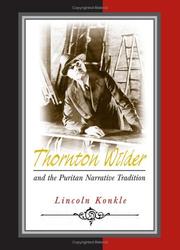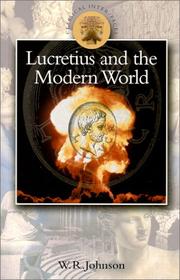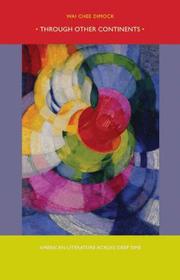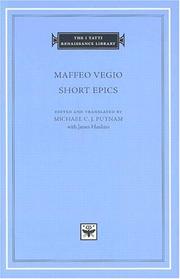| Listing 1 - 8 of 8 |
Sort by
|
Periodical
ISSN: 18795889 18718787 Year: 2006 Publisher: Amsterdam : Rodopi,
Abstract | Keywords | Export | Availability | Bookmark
 Loading...
Loading...Choose an application
- Reference Manager
- EndNote
- RefWorks (Direct export to RefWorks)
Mass media --- Intermediality --- Médias --- Intermédialité --- Intermediality. --- Mass media.
Book
Year: 2006 Publisher: Leiden University Press
Abstract | Keywords | Export | Availability | Bookmark
 Loading...
Loading...Choose an application
- Reference Manager
- EndNote
- RefWorks (Direct export to RefWorks)
When listeners talk about their listening experiences, they often refer to music as if it were a narrative. But can music actually tell a story? Can music be narrative? Traditionally, narrativity is associated with verbal and visual texts, and the mere possibility of musical narrativity is highly debated. In this study, Vincent Meelberg demonstrates that music can indeed be narrative, and that the study of musical narrativity can be very productive. Moreover, Meelberg even makes a stronger claim by contending that contemporary music, too, can be narrative. More specifically, Meelberg suggests considering contemporary musical narratives as metanarratives, i.e. narratives that tell the story of the process of narrativization.
Music --- Discourse analysis, Narrative. --- intermediality --- musical story --- musical narrative --- music --- contemporary music --- muziek --- musical tense --- musical comprehension --- narratology --- musical text --- narrativizering --- atonality --- fabula --- linearity --- metaverhalen --- atonal music --- metanarrative --- musical narrativity --- Concert --- Timbre --- Analysis, appreciation.
Book
Year: 2006 Publisher: Leiden University Press
Abstract | Keywords | Export | Availability | Bookmark
 Loading...
Loading...Choose an application
- Reference Manager
- EndNote
- RefWorks (Direct export to RefWorks)
When listeners talk about their listening experiences, they often refer to music as if it were a narrative. But can music actually tell a story? Can music be narrative? Traditionally, narrativity is associated with verbal and visual texts, and the mere possibility of musical narrativity is highly debated. In this study, Vincent Meelberg demonstrates that music can indeed be narrative, and that the study of musical narrativity can be very productive. Moreover, Meelberg even makes a stronger claim by contending that contemporary music, too, can be narrative. More specifically, Meelberg suggests considering contemporary musical narratives as metanarratives, i.e. narratives that tell the story of the process of narrativization.
Music --- Discourse analysis, Narrative. --- Analysis, appreciation. --- intermediality --- musical story --- musical narrative --- music --- contemporary music --- muziek --- musical tense --- musical comprehension --- narratology --- musical text --- narrativizering --- atonality --- fabula --- linearity --- metaverhalen --- atonal music --- metanarrative --- musical narrativity --- Concert --- Timbre
Book
Year: 2006 Publisher: Leiden University Press
Abstract | Keywords | Export | Availability | Bookmark
 Loading...
Loading...Choose an application
- Reference Manager
- EndNote
- RefWorks (Direct export to RefWorks)
When listeners talk about their listening experiences, they often refer to music as if it were a narrative. But can music actually tell a story? Can music be narrative? Traditionally, narrativity is associated with verbal and visual texts, and the mere possibility of musical narrativity is highly debated. In this study, Vincent Meelberg demonstrates that music can indeed be narrative, and that the study of musical narrativity can be very productive. Moreover, Meelberg even makes a stronger claim by contending that contemporary music, too, can be narrative. More specifically, Meelberg suggests considering contemporary musical narratives as metanarratives, i.e. narratives that tell the story of the process of narrativization.
Music --- Music --- Discourse analysis, Narrative. --- Analysis, appreciation. --- Analysis, appreciation. --- intermediality --- musical story --- musical narrative --- music --- contemporary music --- muziek --- musical tense --- musical comprehension --- narratology --- musical text --- narrativizering --- atonality --- fabula --- linearity --- metaverhalen --- atonal music --- metanarrative --- musical narrativity --- Concert --- Timbre

ISBN: 0826264972 9780826264978 0826216242 9780826216243 Year: 2006 Publisher: Columbia : University of Missouri Press,
Abstract | Keywords | Export | Availability | Bookmark
 Loading...
Loading...Choose an application
- Reference Manager
- EndNote
- RefWorks (Direct export to RefWorks)
"Fresh examination of the works of Thornton Wilder emphasizing continuities in American literature from the seventeenth through twentieth centuries. Sees Wilder as a literary descendant of Edward Taylor who drew from the Puritan worldview and tradition. Includes indepth readings of Shadow of a Doubt, The Trumpet Shall Sound, and others"--Provided by publisher.
Narration (Rhetoric) --- English language --- Puritans --- Christianity and literature --- Influence (Literary, artistic, etc.) --- Puritan movements in literature. --- Artistic impact --- Artistic influence --- Impact (Literary, artistic, etc.) --- Literary impact --- Literary influence --- Literary tradition --- Tradition (Literature) --- Art --- Influence (Psychology) --- Literature --- Intermediality --- Intertextuality --- Originality in literature --- History --- Rhetoric. --- Intellectual life. --- Wilder, Thornton, --- Taylor, Edward, --- Uaĭlder, Tornton, --- Wilder, Thornton Niven, --- Vailders, Torntons, --- וײלדר, תורנטון, --- Criticism and interpretation. --- Technique. --- Religion. --- Influence. --- Vāyldar, Tī., --- وايلدر، تى. --- Germanic languages --- Rhetoric --- Discourse analysis, Narrative --- Narratees (Rhetoric)

ISBN: 1472539907 1472502272 9781472502278 9780715628829 9781472539908 0715628828 9780715628829 9781472502285 1472502280 Year: 2006 Publisher: London
Abstract | Keywords | Export | Availability | Bookmark
 Loading...
Loading...Choose an application
- Reference Manager
- EndNote
- RefWorks (Direct export to RefWorks)
"Lucretius' On the Nature of Things - one of the glories of Latin literature - provides a vivid poetic exposition of the doctrines of the Greek atomist, Epicurus. The poem played a crucial role in the reinvention of science in the seventeenth century, its influence on the French Enlightenment was powerful and pervasive, and it became a major battlefield in the wars of religion with science in nineteenth-century England. But in the twentieth century, despite its vital contributions to modern thought and civilisation, it has been largely neglected by common readers and scientists alike. This book offers an extensive description of the poem, with special emphasis on its cheerful version of materialism and on its attempt to devise an ethical system that suits such a universe. It surveys major relevant texts form the eighteenth and nineteenth centuries (Dryden, Diderot, Voltaire, Tennyson, Santayana) and speculates on why Lucretius and the ancient scientific tradition he championed has become marginalised in the twentieth century. It closes with a discussion of what value the poem has for students of science and technology in the new century: what advice it has to offer us about how to go about reinventing our machines and our morality."--Bloomsbury Publishing Lucretius' On the Nature of Things - one of the glories of Latin literature - provides a vivid poetic exposition of the doctrines of the Greek atomist, Epicurus. The poem played a crucial role in the reinvention of science in the seventeenth century, its influence on the French Enlightenment was powerful and pervasive, and it became a major battlefield in the wars of religion with science in nineteenth-century England. But in the twentieth century, despite its vital contributions to modern thought and civilisation, it has been largely neglected by common readers and scientists alike. This book offers an extensive description of the poem, with special emphasis on its cheerful version of materialism and on its attempt to devise an ethical system that suits such a universe. It surveys major relevant texts form the eighteenth and nineteenth centuries (Dryden, Diderot, Voltaire, Tennyson, Santayana) and speculates on why Lucretius and the ancient scientific tradition he championed has become marginalised in the twentieth century. It closes with a discussion of what value the poem has for students of science and technology in the new century: what advice it has to offer us about how to go about reinventing our machines and our morality
Atomism. --- Atomic theory --- Philosophy --- Philosophy, Ancient --- Pluralism --- Lucretius Carus, Titus. --- Lucretius Carus, Titus --- Lukrecjusz Karus, Tytus --- Lukret︠s︡iĭ Kar, Tit --- Lucrezio, Tito --- Lucrèce --- Lucrez --- Lukrez --- Lucrecio Caro, T. --- Caro, T. Lucrecio --- Carus, Titus Lucretius --- Lucretius --- Lucrezio Caro, Tito --- Lucrecio --- Lucreti Cari, T. --- Lucreci --- לוקרציוס קרוס, טיטוס --- Influence. --- Influence (Literary, artistic, etc.) --- Artistic impact --- Artistic influence --- Impact (Literary, artistic, etc.) --- Literary impact --- Literary influence --- Literary tradition --- Tradition (Literature) --- Art --- Influence (Psychology) --- Literature --- Intermediality --- Intertextuality --- Originality in literature

ISBN: 1282463225 9786612463228 1400829526 9781400829521 9780691114507 0691114501 0691114498 9780691114491 9781282463226 6612463228 9780691114 Year: 2006 Publisher: Princeton, N.J. Princeton Univ. Press
Abstract | Keywords | Export | Availability | Bookmark
 Loading...
Loading...Choose an application
- Reference Manager
- EndNote
- RefWorks (Direct export to RefWorks)
What we call American literature is quite often a shorthand, a simplified name for an extended tangle of relations." This is the argument of Through Other Continents, Wai Chee Dimock's sustained effort to read American literature as a subset of world literature. Inspired by an unorthodox archive--ranging from epic traditions in Akkadian and Sanskrit to folk art, paintings by Veronese and Tiepolo, and the music of the Grateful Dead--Dimock constructs a long history of the world, a history she calls "deep time." The civilizations of Mesopotamia, India, Egypt, China, and West Africa, as well as Europe, leave their mark on American literature, which looks dramatically different when it is removed from a strictly national or English-language context. Key authors such as Thoreau, Margaret Fuller, Ezra Pound, Robert Lowell, Gary Snyder, Leslie Silko, Gloria Naylor, and Gerald Vizenor are transformed in this light. Emerson emerges as a translator of Islamic culture; Henry James's novels become long-distance kin to Gilgamesh; and Black English loses its ungrammaticalness when reclassified as a creole tongue, meshing the input from Africa, Europe, and the Americas. Throughout, Dimock contends that American literature is answerable not to the nation-state, but to the human species as a whole, and that it looks dramatically different when removed from a strictly national or English-language context.
Influence (Literary, artistic, etc.) --- Globalization in literature. --- American literature --- Artistic impact --- Artistic influence --- Impact (Literary, artistic, etc.) --- Literary impact --- Literary influence --- Literary tradition --- Tradition (Literature) --- Art --- Influence (Psychology) --- Literature --- Intermediality --- Intertextuality --- Originality in literature --- English literature --- Agrarians (Group of writers) --- Foreign influences. --- History and criticism. --- Globalization in literature --- Foreign influences --- History and criticism --- Influence (Literary, artistic, etc.). --- Literature, Comparative --- American and Ancient. --- Ancient and American. --- Literature [Comparative ] --- American and Ancient --- Thoreau, Henry David --- Fuller, Margaret --- James, Henry --- Pound, Ezra Loomis --- Lowell, Robert Traill Spence, Jr.

ISBN: 9780691125374 0691125376 9780674014831 9786612129698 1282129694 1400827426 0674014839 9781400827428 9780691125376 Year: 2006 Volume: 15 Publisher: Princeton Princeton university press
Abstract | Keywords | Export | Availability | Bookmark
 Loading...
Loading...Choose an application
- Reference Manager
- EndNote
- RefWorks (Direct export to RefWorks)
"The lives of Catullus and Horace overlap by a dozen years in the first century BC. Yet, though they are the undisputed masters of the lyric voice in Roman poetry, Horace directly mentions his great predecessor, Catullus, only once, and this reference has often been taken as mocking. In fact, Horace's allusion, far from disparaging Catullus, pays him a discreet compliment by suggesting the challenge that his accomplishment presented to his successors, including Horace himself. In Poetic Interplay, the first book-length study of Catullus's influence on Horace, Michael Putnam shows that the earlier poet was probably the single most important source of inspiration for Horace's Odes, the later author's magnum opus. Except in some half-dozen poems, Catullus is not, technically, writing lyric because his favored meters do not fall into that category. Nonetheless, however disparate their preferred genres and their stylistic usage, Horace found in the poetry of Catullus, whatever its mode of presentation, a constant stimulus for his imagination. And, despite the differences between the two poets, Putnam's close readings reveal that many of Horace's poems echo Catullus verbally, thematically, or both. By illustrating how Horace often found his own voice even as he acknowledged Catullus's genius, Putnam guides us to a deeper appreciation of the earlier poet as well"--Provided by publisher.
Helen of Troy (Greek mythology) in literature. --- Influence (Literary, artistic, etc.). --- Odes, Latin --- Hélène (Mythologie grecque) dans la littérature --- Influence littéraire, artistique, etc. --- Odes latines --- History and criticism. --- Histoire et critique --- Horace --- Catullus, Gaius Valerius --- Virgil --- Knowledge --- Literature. --- Influence. --- In literature. --- Rome --- Rome dans la littérature --- Helen of Troy (Greek mythology) in literature --- Influence (Literary, artistic, etc.) --- Odes --- History and criticism --- Literature --- Influence --- In literature --- Hélène (Mythologie grecque) dans la littérature --- Influence littéraire, artistique, etc. --- Rome dans la littérature --- Artistic impact --- Artistic influence --- Impact (Literary, artistic, etc.) --- Literary impact --- Literary influence --- Literary tradition --- Tradition (Literature) --- Vergil --- Virgile --- Virgilio Máron, Publio --- Virgilius Maro, Publius --- Vergili Maronis, Publius --- Catul --- Catull --- Catulle --- Catulli, C. Valerii --- Catullo, Gaio Valerio --- Catullus, C. Valerius --- Catullus, Gaius Valerius, --- Catullus, Gajus Valerius --- Catulo --- Katull, Gaǐ Valeriǐ --- Katullus, Kaius Valerius --- Valerio Cátulo, Cayo --- Катулл --- Orazio --- Horacij Flakk, Kvint --- Epic poetry, Latin (Medieval and modern) --- Astyanax (Legendary character) --- Jason (Greek mythology) --- Poésie épique latine médiévale et moderne --- Astyanax (Personnage légendaire) --- Enée (Personnage légendaire) --- Jason (Mythologie grecque) --- Vegio, Maffeo, --- Anthony, --- Poésie épique latine médiévale et moderne --- Astyanax (Personnage légendaire) --- Enée (Personnage légendaire) --- Lyric poetry --- Poetry --- Art --- Influence (Psychology) --- Intermediality --- Intertextuality --- Originality in literature --- Helen, --- Elena, --- Helena, --- Helenē, --- Yelena, --- 海伦 , --- ヘレネー, --- הלנה, --- העלענע, --- 헬레네, --- Хелена, --- Єлена, --- Елена , --- هلن, --- هيلين, --- Ἑλένη, --- Aeneas (Legendary character) --- Latin epic poetry, Medieval and modern --- Latin poetry, Medieval and modern --- Scamandrius (Legendary character) --- Legends --- Veggius, Mapheus, --- Vegius, Mapheus, --- Anbā Anṭūnīyūs, --- Anthony the Abbot, --- Antoine, --- Antoniĭ Velikiĭ, --- Antonio, --- Antonius, --- Antonius Magnus, --- Antony, --- Qiddīs Anṭūnīyūs, --- قديس مصر أنطونيوس --- Horatius Flaccus, Quintus --- Vergilius Maro, Publius --- in literature. --- Horatius Flaccus, Q. --- Translations into English. --- Poetry. --- Traductions anglaises --- Poésie --- Virgilius Maro, Publius, --- Virgilio Marone, P., --- Vergilīĭ, --- Virgile, --- Vergílio, --- Wergiliusz, --- Vergilīĭ Maron, P. --- Vergilīĭ Maron, Publīĭ, --- Verhiliĭ Maron, P., --- Vergil, --- Virgilio, --- Virgilīĭ, --- Virgilius Maro, P., --- Virgil Maro, P., --- ווירגיל, --- וירגיליוס, --- ורגיליוס, --- מרו, פובליוס ורגיליוס, --- فرجيل, --- Pseudo-Virgil, --- Pseudo Virgilio, --- Virgilio Marón, Publio, --- Bhārjila, --- Vergilius Maro, P. --- Vergilius --- Virgilio Marone, P. --- Vergilīĭ --- Vergílio --- Wergiliusz --- Vergilīĭ Maron, Publīĭ --- Verhiliĭ Maron, P. --- Virgilio --- Virgilius Maro, P. --- Virgil Maro, P. --- Pseudo-Virgil --- Pseudo Virgilio --- Virgilio Marón, Publio --- Bhārjila --- Catullus, Caius Valerius --- Aeneas --- Jason --- Helen --- Anton, --- Gorat︠s︡īĭ --- Gorat︠s︡iĭ Flakk, Kvint --- Horacij --- Horacio, --- Horacio Flaco, Q. --- Horacjusz --- Horacjusz Flakkus, Kwintus --- Horacy --- Horaṭiyos --- Horaṭiyus --- Horats --- Horaz --- Khorat︠s︡iĭ --- Khorat︠s︡iĭ Flak, Kvint --- Orazio Flacco, Quinto --- הוראציוס --- הורטיוס --- Odes - History and criticism --- Horace - Knowledge - Literature --- Catullus, Gaius Valerius - Influence --- Virgil - In literature --- Rome - In literature --- Marone, Publio Virgilio --- Vegio, Maffeo
| Listing 1 - 8 of 8 |
Sort by
|

 Search
Search Feedback
Feedback About
About Help
Help News
News